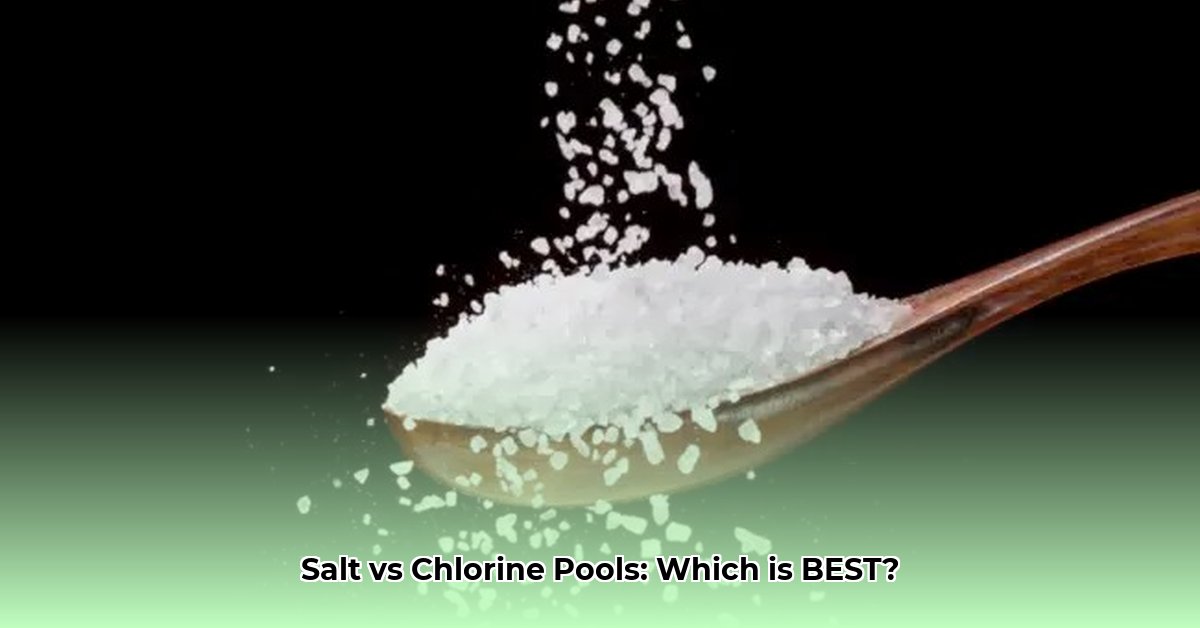Picking the right way to keep your pool clean can be tricky! This guide breaks down the two main options: saltwater and chlorine pools. We’ll compare costs, maintenance, and how they affect your health, so you can choose the best system for your lifestyle and budget. Whether you’re a penny-pincher or want the best of the best, we’ll help you figure out which pool type is perfect for you and keep your pool sparkling clean for years to come. For more on saltwater pool care, check out this helpful guide: [saltwater pool maintenance](https://www.wavesold.com/salt-water-pool-maintenance/).
Salt Water vs Chlorine Pool: Making the Right Splash
Choosing between a saltwater pool and a chlorine pool can be tricky, but understanding the nuances of each system is key. Both keep your pool sparkling clean, but they work differently, need varying levels of upkeep, and have different long-term costs; understanding these variations will assist you in selecting the most effective type. Let’s dive in and clear up the confusion!
Understanding the Basics: Salt vs. Chlorine
Traditional chlorine pools rely on manually adding chlorine, typically in liquid, granular, or tablet form. Regular testing and adjustments are essential to maintain proper sanitation levels. This means routinely checking the water’s chemistry and adding more chlorine to compensate for its natural breakdown and consumption.
Saltwater pools, conversely, employ a salt chlorine generator (also known as a salt cell) to convert dissolved salt into chlorine through electrolysis. The chlorine produced then sanitizes the pool water. The generator continuously replenishes chlorine levels, resulting in a more stable and consistent sanitization process. Many pool owners find that the resulting water feels softer and is less irritating to the skin and eyes.
The Price Tag: Upfront Costs and Pool System Investment
The initial investment for a chlorine pool is generally lower. The primary costs include purchasing chlorine, testing kits, and basic dispensing equipment. Saltwater systems, however, require a larger upfront investment. This is mainly due to the expense of the salt chlorine generator, which can range from $800 to $3,000 or more, depending on the size and features of the unit. Additional costs may include professional installation and any necessary upgrades to your pool’s electrical system.
Ongoing Costs: The Long Haul and Chemical Savings
While saltwater pools have a higher upfront cost, they often offer long-term savings on chemical expenses. Because the system generates its own chlorine, you’ll significantly reduce the need for purchasing chlorine tablets or liquid chlorine. The primary ongoing cost will be replenishing the pool with salt, which is considerably cheaper than buying chlorine. Expect to spend $100-$300 annually on salt, depending on your pool size and usage.
Chlorine pools, on the other hand, require consistent purchases of chlorine, algaecides, and other balancing chemicals to maintain water quality. These regular purchases can add up significantly over time, potentially costing $400 – $1000 or more per year.
The Swimming Experience: Comfort and Safety
Many swimmers find saltwater pools gentler on their skin and eyes. This is primarily because the chlorine levels are typically lower and more stable in saltwater pools compared to traditional chlorine pools. The lower chlorine levels reduce the production of chloramines, irritating byproducts that form when chlorine reacts with organic matter in the water, such as sweat and urine. Chloramines are responsible for the unpleasant chlorine odor and can cause skin and eye irritation.
High chlorine levels in traditional pools, on the other hand, can lead to dry, itchy skin, red eyes, and faded swimwear. However, it’s crucial to remember that proper maintenance, including regular water testing and balancing, is essential for both types of pools to ensure a safe and enjoyable swimming experience.
Pool Materials: A Compatibility Check
The type of pool construction materials can influence your sanitation choice. Concrete, plaster, and gunite pools can be more susceptible to the corrosive effects of saltwater over time. Regular monitoring of pH levels and the use of a sacrificial anode can help mitigate corrosion. Vinyl liner and fiberglass pools generally hold up better against saltwater exposure. It’s always best to consult with a pool professional to determine the best sanitation system for your specific pool type and materials.
Beyond Salt and Chlorine: Other Options for Water Sanitation
While saltwater and chlorine systems are the most common, alternative water sanitation methods are available.
- UV Systems: Ultraviolet (UV) systems use UV light to kill bacteria, viruses, and algae in the water. UV systems can significantly reduce the need for chlorine but are typically used in conjunction with a small amount of chlorine for residual sanitation.
- Ozone Systems: Ozone systems use ozone gas to oxidize and destroy contaminants in the water. Like UV systems, ozone systems can reduce chlorine usage but are often used with a supplemental sanitizer.
- Mineral Systems: These systems use mineral cartridges containing silver and copper ions to inhibit algae growth and sanitize the water. Mineral systems often reduce chlorine requirements and can improve water clarity.
These alternative systems can offer various benefits but also come with their own costs and maintenance requirements.
Making the Right Choice: Your Personal Needs and Preferences
The best pool system ultimately depends on your individual needs, preferences, and budget. Consider the following factors when making your decision:
- Budget: Evaluate both the upfront and ongoing costs of each system.
- Maintenance: Determine how much time and effort you’re willing to dedicate to pool maintenance.
- Swimming Experience: Consider your sensitivity to chlorine and desired water feel.
- Pool Type: Assess the compatibility of the sanitation system with your pool’s construction materials.
- Environmental Concerns: Consider the environmental impact of each system, including chemical usage and energy consumption.
Answering these questions will help you narrow down your choices and select the best pool system for your needs.
Comparing Saltwater and Chlorine Pools: A Quick Overview
Here’s a handy table summarizing the key differences:
| Feature | Saltwater Pool | Chlorine Pool |
|---|---|---|
| Initial Cost | Higher | Lower |
| Ongoing Costs | Typically Lower | Typically Higher |
| Chemical Handling | Less Frequent | More Frequent |
| Swimming Feel | Generally Gentler | Can be Harsher |
| Maintenance | Less Hands-on | More Hands-on |
| Material Impact | Potential for Corrosion (some types) | Minimal Corrosion |
Remember, consulting with a qualified pool professional is highly recommended. They can assess your specific situation, provide personalized advice, and help you choose the system that best fits your needs and budget. Don’t hesitate to get multiple opinions! Choosing the right pool system is a big decision!
How to Choose Between Saltwater and Chlorine Pool Systems Based on Long-Term Costs
So, you’re building a pool—fantastic! But saltwater or chlorine? That’s the million-dollar question, isn’t it? Let’s dive into how to choose between saltwater and chlorine pool systems based on long-term costs. It’s all about weighing upfront investment against ongoing expenses.
Understanding the Upfront Costs and Pool Construction Costs
The initial investment significantly differs. Saltwater systems generally cost more upfront. Why? You’re buying a chlorine generator—a significant expense, typically ranging from $800 to $3,000 or more. Additionally, you might need to upgrade your pool’s electrical system to accommodate the generator. Chlorine systems, using traditional chlorine tablets or granules, start cheaper. The primary upfront costs are the chlorine itself, testing kits, and basic dispensing equipment. Think of it like this: saltwater pools are like buying a premium appliance; chlorine pools are more like buying the basic model. The initial price difference is crucial, affecting your how to choose between saltwater and chlorine pool systems based on long-term costs decision.
- Saltwater pools require a higher initial investment due to the cost of the chlorine generator.
- Chlorine pools are less expensive to set up initially, using basic chlorine tablets or granules.
- The upfront cost difference significantly impacts the overall financial decision.
Ongoing Chemical Costs: Where the Savings Emerge
Here’s where the picture changes. Saltwater systems generate chlorine using salt, minimizing the need for constant chlorine purchases. You’ll still need to replenish the salt periodically, but this is far cheaper than buying chlorine regularly. Expect to spend $100-$300 annually on salt, depending on your pool size and usage. Chlorine pools, on the other hand, demand consistent chlorine additions, along with other balancing chemicals like algaecides and pH adjusters. This adds up over time. Typical annual costs for chlorine and other chemicals can range from $400 to $1000 or more. Over five years, the chemical cost difference could be substantial. Would you rather spend less on chemicals with a saltwater system over a five-year span?
Maintenance Requirements: Time vs. Money and Operational Costs
Both systems demand regular maintenance. However, the nature of this maintenance differs significantly for how to choose between saltwater and chlorine pool systems based on long-term costs. Saltwater pools usually need less frequent chemical balancing. The generator does the bulk of the work. However, you must replace the salt cell eventually, which is a considerable expense, typically every 3-7 years, costing between $400 and $900. Chlorine pools require more frequent testing and adjustments to the chemical balance, needing more hands-on involvement. This can take several hours per week. Consider your time and skills; are you comfortable regularly managing the complex chemistry of a chlorine pool?
Equipment Lifespan and Repair Costs
Equipment longevity factors into
- Glass Tile Shower Ideas to Create a Stunning Bathroom Space - December 7, 2025
- Glass Wall Tile Ideas for Kitchens and Bathrooms - December 6, 2025
- Glass Tile Bathroom: Create a Beautiful, Easy-Clean Space - December 5, 2025










